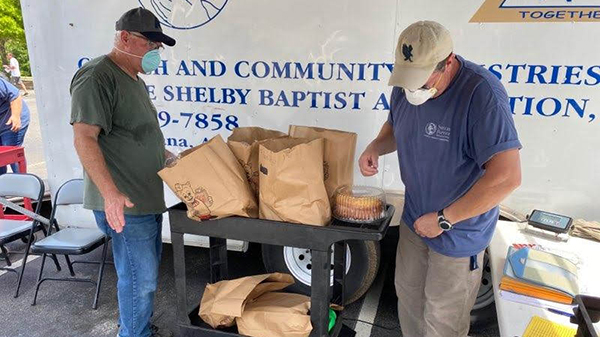When the COVID-19 pandemic brought restrictions on gatherings and advice to shelter at home, Tim Wheat, pastor of missional living at Shades Mountain Baptist Church, Vestavia Hills, immediately began to think about how he could help church members live on mission during the crisis.
And he wasn’t alone. Other pastors and leaders began to look for opportunities for members to serve, even while staying home.
“Learning to be a missionary where you are” can mean something as simple as a prayer walk around your neighborhood and praying for your neighbors, Wheat said.
And flexibility is key, said Chris Chambers, minister of missions at First Baptist Church, Trussville, where church members are serving older congregation members by providing grocery delivery to those who can’t get out.
“The methods changed but not the message,” Chambers said. “We are called to share Jesus in everything we do. We are learning new ways to reach our community and our world.”
Spencer Knight, minister of ministries at Hunter Street Baptist Church, Birmingham, said missions work at his church also has changed, and “it’s gotten a lot busier.” But with the increase in need, an increase in the desire to help has flourished.
“This experience has affirmed that God is faithful, and that Christians are people who, because they have experienced God’s grace, like to display and give grace. They are people who want to continue to serve their community, love their community and to love their neighbors because of how the gospel has transformed them. It’s a joy to be able to see … that we’re not a building. We’re a people,” said Knight.
The three churches, along with First Baptist Church, Birmingham, recently worked together to host a drive-thru food drive to benefit local benevolence ministries, including Birmingham’s Christian Service Mission.
Working together
Rich Hutchens, associate pastor of discipleship and missions at FBC Birmingham, said working together makes even more sense in a time when gatherings are more difficult.
“One of the things I’ve discovered through this experience is just how precious human relationships are and how vital to our well-being,” Hutchens said. “I think we can tend to take each other for granted when we see folks Sunday morning, Sunday evening, Wednesday night and throughout the week. When that disappeared, I felt the loss, a certain void. It’s a reminder for me that God has created us to live in fellowship.”
Connecting with others
Shelby Baptist Association also uses partnerships to share the gospel and connect those in need to local churches. Two of the association’s ministries that have been busy during the past few weeks are the association’s mobile food pantry and the Community of Hope Health Clinic, which serves uninsured Shelby County residents.
After the stay-at-home order began and many lost work, Dr. John McGuinness, Community of Hope medical director, heard fears about running out of food from patient after patient.
McGuinness wanted to buy groceries and distribute them, but Justin Johnston, executive director of the clinic, provided a better solution.
Working with Rebekah Parr, ministry evangelism catalyst for the Shelby Baptist Association, the association started setting up the association’s Mobile Daily Bread Shop in the clinic’s parking lot to distribute food to patients in need.
Adapting to needs
Adapting their normal procedures, clients served by the food pantry are interviewed by phone upon arrival, and while they wait, a chaplain speaks with each family, prays with them and gives them a Bible.
At the health clinic, a staff member speaks with each patient about their food needs and then sends a list to the mobile pantry. Volunteers at the food pantry box up what they need, add a Bible and drop off the box at the clinic. Later, each patient receives a follow-up call that includes prayer and a gospel conversation.
Sometimes that first conversation leads to another opportunity to share God’s love. Recently, a Hispanic family who received assistance from the mobile food pantry also got a follow-up call from the pastor at a local Hispanic church. The family ended up joining that church’s online prayer meeting. Creating such opportunities to share the gospel is the goal, Parr said.
“We as the people of God need to be ready when we’re thrown a curveball like COVID-19. We can’t let it paralyze us,” Parr said. “The Great Commission is still our mission even though our methods may have to change.”






Share with others: